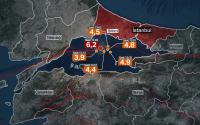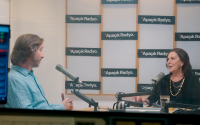26 June 2008TruthdigKasia Anderson
Critics and challengers of Naomi Klein's work had better take a close look at her latest book, "The Shock Doctrine: The Rise of Disaster Capitalism," before launching their attacks. This is one writer whose research and documentation are so exhaustive that would-be detractors will not only find her analysis to be dauntingly watertight, even if they don't share her views about the unnatural disasters enabled by free-market capitalism, but they might also discover that some of her source material seems strangely familiar.
That's because she took a page—or several hundred pages, rather—from just the sort of think tanks, government officials, scholars and publications that would seem to oppose her ideas most forcefully. But instead of trying to explain recurring socioeconomic patterns in the wake of various global crises by using a familiar "lefty" lens to justify her claims, Klein looks to the likes of Milton Friedman, the Cato Institute, Henry Kissinger and the Financial Times to bolster her argument about how "disaster capitalism" was cooked up decades ago and how it can explain what happened following Hurricane Katrina, Augusto Pinochet's 1973 Chilean coup, and more recent events like Burma's cyclone and the floods in the American Midwest.
The inner workings and key subscribers of disaster capitalism were exposed when the book first came out last September. Klein called in just before the June 24 paperback release of "The Shock Doctrine" to discuss with Truthdig's Associate Editor Kasia Anderson this scary piece of nonfiction, as well as the resource-rich Shock Doctrine Web site, and how she believes the notion of disaster capitalism is, unfortunately, still relevant at this moment.
Kasia Anderson: So, I have read your book and was very alarmed, and I think it was a nice wake-up call for me. But let's start out by talking a little bit about disaster capitalism, which is the central idea of your book. I was reading your L.A. Times article from earlier this year and you say, "Over the last four years, I have been researching a little-explored area of economic history: the way that crises have paved the way for the march of the right-wing economic revolution across the globe. A crisis hits, panic spreads and the ideologues fill the breach, rapidly reengineering societies in the interests of large corporate players. It's a maneuver I call 'disaster capitalism.' " So that lays the groundwork a little bit.
Now, with all due respect to your keen perception, why do you think this is a "little-explored area of economic history" when you're looking at events that go back as far as five decades?
Naomi Klein: Well, I think largely because this is our contemporary history, and there hasn't been that much looking back at how ... the economic model that has been dominant since Reagan—how it has spread throughout the world, and when there is a look back, the people doing the looking back are the people who imposed the policies in the first place. It's been a victor's history, and it's been a history told by the Cato Institute and the Heritage Foundation, and there have been some important left-wing academics who have begun to provide a counter-history like David Harvey at CUNY University ... a couple of years ago [he] wrote "A Brief History of Neoliberalism," which was really the first alternative history of how these ideas swept the globe.
But, in terms of why the crisis has not been understood by popular audiences before—popular readers before—has to do with the fact that, not that this is a secret, but that it's a tactic that has been discussed exclusively in technocratic circles. So my sources on this are, you know, Washington conferences attended by central bank presidents, think tanks, the International Monetary Fund. And there is a kind of an armor that goes up around how highly technical and specialized the language is around these discussions—it's almost designed to make laypeople's eyes roll back into their heads.
So, I was fortunate to work with some wonderful researchers, graduate students, who were working in these areas of researching World Bank policies, and came across this sort of cache of literature, of technocratic literature, and we found the smoking-gun quotes like John Williamson, who was the man who coined the term the Washington consensus, a very powerful Washington economist, admitting that there had never been a case of a developing world country accepting the Washington consensus without a crisis, and he gave a name for this, he called it "The Crisis Hypothesis." And it turns out that there had been all these studies conducted by think tanks, by academic economists, studying the interrelationship between what they call deep crisis and deep reform. And once again, if you didn't know what you were looking for, you wouldn't necessarily read a paper with that title, you know?
Anderson: Yeah.
Klein: But once I knew what I was looking for, I started to see it all over the place.
Anderson: So, can you briefly walk us through how a seemingly politically unrelated disaster, like a natural disaster, creates the condition for economic shock therapy and how it plays out from there?
Klein: Yeah, I think what this comes out of is a profound understanding that the more radical pieces of the right-wing economic program like privatizing Social Security or privatizing water just don't enjoy popular support, and that creates a problem in a democracy—it doesn't create a problem in a dictatorship, because you can do it anyway in a dictatorship.
Anderson: Right.






